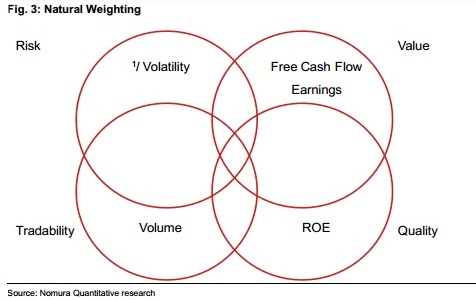(October 10, 2013) – The craze for alternative indices has shown no sign of stopping, with Nomura now adding its natural weighting index to the mix.
Unlike other smart beta approaches, Nomura has abandoned the screening process adopted by some in favour of creating a re-weighted index using the concept of the “natural weight” of a company.
This looks at flow variables, such as earnings and cash flow, volume, contribution to market return on equity, and then blending it with risk parity.
This long-only static equity alternative beta index has mean reversion theory at its heart, and Nomura believes it offers a better risk/return profile to standard indices without resorting to heavy trading costs.
Nomura also argued that its natural weighting strategy was better than traditional risk parity, as risk parity has no mean reversion input, which it said was “one of the most fundamental forces in finance”.
“The result is a strategy that, from a risk perspective, is passive but the stocks that have a larger weight do not have more attractive valuation,” Nomura explained.
“Risk parity is also dependent on the covariance matrix being right as the only input. Although as the degree of concentration is lower, this is less of a problem than it is for minimum variance.”
Fundamental indexation— a method of alternative indexing which sees an index weighted by accounting, non-price-based variables—also has flaws because, as a value-based index it is susceptible to value traps, where value stocks stay out of favour for a long time.
“Ideally, we would favour balancing value with another measure. This could be a technical factor like momentum for shorter holding periods, or quality for longer holding periods,” Nomura wrote.
“It also needs to have confidence in the accounting data as that is the only source of weighting. In addition, in the usual approaches to fundamental indexation, the focus only on simple USD notional values misses, we think, the concept of quality that usually can only be captured as a ratio of other parameters.”
Under Nomura’s natural weighting approach, the index is created by looking at the cash flow and forward earnings of stocks (that lend a natural value bias), the contribution to market return on equity (that lends a quality bias) and volatility and volume that encompass measures of riskiness and capacity.
How does it perform? Comparing the natural weighting approach to risk parity and other measures against the FTSE World index with a 500 stock universe, natural weighting trumps them all with a return of 9% and a Sharpe ratio of 0.6. The FTSE World Index returned 6.6% over the same period, and risk parity returned 8.4%.
The turnover, defined as the aggregate of the absolute changes of position that taking place during a rebalancing period, was also found to be far less in a natural weighting approach when compared to risk parity.
The full paper can be found here.
Related Content: Alternative Index Strategies Rise, But Are Investors Buying it? and The Smart Beta Trade-Off

